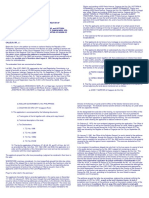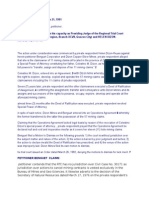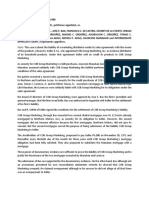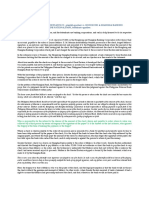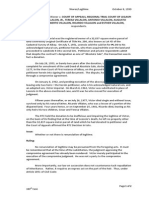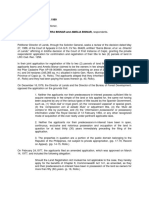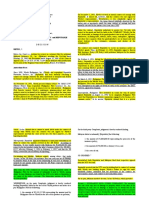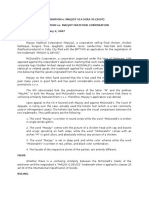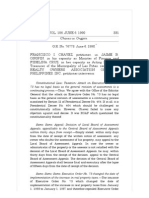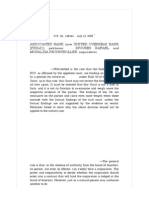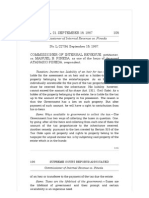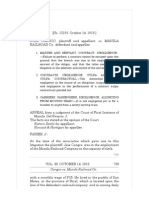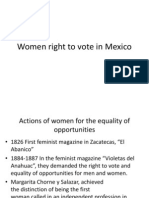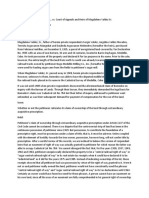0 ratings0% found this document useful (0 votes)
101 viewsSingson Vs Lim
Singson Vs Lim
Uploaded by
Jillian BatacThis document is a Supreme Court case from 1943 regarding the testate estate of Vicente Singson Pablo. The key details are:
1) Pablo died without descendants or ascendants, leaving a will distributing his properties.
2) Clause 8 of the will stated that any properties not otherwise disposed of should be distributed equally to all those entitled to them.
3) Pablo's brothers argued the nieces were not entitled to a share under clause 8 and the Civil Code, while the nieces argued certain properties were omitted from the partition.
4) The court affirmed the trial court's ruling that clause 8 evidenced Pablo's intent to avoid uncertainty and include all who would inherit intestate, including both brothers
Copyright:
© All Rights Reserved
Available Formats
Download as DOCX, PDF, TXT or read online from Scribd
Singson Vs Lim
Singson Vs Lim
Uploaded by
Jillian Batac0 ratings0% found this document useful (0 votes)
101 views2 pagesThis document is a Supreme Court case from 1943 regarding the testate estate of Vicente Singson Pablo. The key details are:
1) Pablo died without descendants or ascendants, leaving a will distributing his properties.
2) Clause 8 of the will stated that any properties not otherwise disposed of should be distributed equally to all those entitled to them.
3) Pablo's brothers argued the nieces were not entitled to a share under clause 8 and the Civil Code, while the nieces argued certain properties were omitted from the partition.
4) The court affirmed the trial court's ruling that clause 8 evidenced Pablo's intent to avoid uncertainty and include all who would inherit intestate, including both brothers
Original Description:
Succession
Original Title
Singson vs Lim
Copyright
© © All Rights Reserved
Available Formats
DOCX, PDF, TXT or read online from Scribd
Share this document
Did you find this document useful?
Is this content inappropriate?
This document is a Supreme Court case from 1943 regarding the testate estate of Vicente Singson Pablo. The key details are:
1) Pablo died without descendants or ascendants, leaving a will distributing his properties.
2) Clause 8 of the will stated that any properties not otherwise disposed of should be distributed equally to all those entitled to them.
3) Pablo's brothers argued the nieces were not entitled to a share under clause 8 and the Civil Code, while the nieces argued certain properties were omitted from the partition.
4) The court affirmed the trial court's ruling that clause 8 evidenced Pablo's intent to avoid uncertainty and include all who would inherit intestate, including both brothers
Copyright:
© All Rights Reserved
Available Formats
Download as DOCX, PDF, TXT or read online from Scribd
Download as docx, pdf, or txt
0 ratings0% found this document useful (0 votes)
101 views2 pagesSingson Vs Lim
Singson Vs Lim
Uploaded by
Jillian BatacThis document is a Supreme Court case from 1943 regarding the testate estate of Vicente Singson Pablo. The key details are:
1) Pablo died without descendants or ascendants, leaving a will distributing his properties.
2) Clause 8 of the will stated that any properties not otherwise disposed of should be distributed equally to all those entitled to them.
3) Pablo's brothers argued the nieces were not entitled to a share under clause 8 and the Civil Code, while the nieces argued certain properties were omitted from the partition.
4) The court affirmed the trial court's ruling that clause 8 evidenced Pablo's intent to avoid uncertainty and include all who would inherit intestate, including both brothers
Copyright:
© All Rights Reserved
Available Formats
Download as DOCX, PDF, TXT or read online from Scribd
Download as docx, pdf, or txt
You are on page 1of 2
G.R. No.
48627, Testate Estate of
Singson Pablo. Vda. de Singson v.
Vda. de Lim, 74 Phil. 109
Republic of the Philippines
SUPREME COURT
Manila
EN BANC
February 19, 1943
G.R. No. 48627
TESTATE ESTATE OF VICENTE SINGSON PABLO, deceased. ROSALIA
ROSARIO VDA. DE SINGSON, petitioner-appellee,
vs.
JOSEFINA F. VDA. DE LIM, oppositor-appellee,
EMILIA FLORENTINO, ET AL., oppositors-appellees,
EVARISTO SINGSON, ET AL., oppositors-appellants.
M.H. de Joya and Evaristo Singson for appellants.
Teofilo Mendoza and Vicente Paz for appellees.
OZAETA, J .:
Don Vicente Singson Pablo, a lawyer of Vigan, Ilocos Sur, died on April 15, 1938,
without any descendant or ascendant, his nearest surviving relatives being his widow
Doa Rosalia Rosario, four brothers, and four nieces, the children of a deceased sister.
He left a will which was duly probated, clause 8 of which reads as follows:
Octavo. Orderno y mando que todos mis bienes no dispuestos de otro modo en este
testamento, se distribuiran en partes iguales a todos los que tienen derecho a ello.
The widow, as administratrix, presented a project of partition in which the properties
not disposed of in the will were adjudicated to the four brothers and the four nieces of
the deceased "in the proportion provided in paragraph 8 of the will." The brothers,
appellants herein, objected to the project of partition insofar as it includes the nieces
of the deceased, on the ground that under clause 8 of the will, in relation to article 751
of the Civil Code, they were not entitled to any share. The nieces also objected to the
project of partition, alleging that certain other specified properties had been omitted
therefrom, which formed part of the properties not disposed of and which under clause
8 of the will "should be distributed in equal parts to all who are entitled thereto." The
trial court sustained the contention of the nieces (appellees herein) and ordered the
administratrix "to amend the project of partition so as to include therein the said
properties and that all of those not disposed of in the will be adjudicated in equal parts
to the brothers and nieces of the deceased."
The only question raised in this appeal is the interpretation of clause 8 of the will
above quoted. Said clause provides that "all of my properties not disposed of
otherwise in this testament shall be distributed in equal parts to all who are entitled
thereto." In this connection appellants invoke article 751 of the Civil Code, which
provides that "a disposition made in general terms in favor of the testator's relatives
shall be understood as made in favor of those nearest in degree."
The trial court noted that the testator, who was a lawyer, did not use the word
"relatives" in the clause in question. We do not need to decide here whether, had the
testator used the word "relatives," the nieces would be excluded. The authorities differ
on the interpretation of article 751. Some hold that under said article the nephews and
nieces inherit by representation together with the brothers and sisters of the testator, as
in legal succession; while others. Manresa among them, hold that said article excludes
nephews and nieces when brothers and sisters survive. We think the testator, by
referring to "all who are entitled thereto," instead of referring to his "relatives,"
precisely meant to avoid the uncertainty of the interpretation of article 751 and to
indicate his wish that the residue of his estate be distributed in equal parts to all who
would have been entitled to inherit from him had he dies intestate.
The order appealed from is affirmed, with costs. So ordered.
Yulo, C.J., Moran, Paras and Bocobo, JJ., concur
You might also like
- Gaite Vs Fonacier 2SCRA 830 (1961)Document2 pagesGaite Vs Fonacier 2SCRA 830 (1961)Jillian Batac100% (1)
- Torts 45 ALR4th 289Document10 pagesTorts 45 ALR4th 289Jillian BatacNo ratings yet
- Credit Digest EasternvCADocument2 pagesCredit Digest EasternvCAAnonymous m2C4FCnscvNo ratings yet
- 127 - National Exchange Vs DexterDocument1 page127 - National Exchange Vs Dextermimiyuki_No ratings yet
- Alvarez V IacDocument38 pagesAlvarez V Iacroswin matigaNo ratings yet
- 2 Republic vs. Vda. de NeriDocument9 pages2 Republic vs. Vda. de NeriMutyaAlmodienteCocjinNo ratings yet
- NBNMBMDocument4 pagesNBNMBMMarlene TongsonNo ratings yet
- Rivera Vs EspirituDocument5 pagesRivera Vs EspirituTyrone John CortezNo ratings yet
- Albano V ColomaDocument2 pagesAlbano V Colomamay_omelanNo ratings yet
- Santos Vs LumbaoDocument2 pagesSantos Vs LumbaoYvon BaguioNo ratings yet
- Phil. Veterans Bank V CADocument8 pagesPhil. Veterans Bank V CAApril DiolataNo ratings yet
- Valarao V PascualDocument2 pagesValarao V PascualJohn YeungNo ratings yet
- Lopez Vs LiboroDocument1 pageLopez Vs LiboroemersonNo ratings yet
- Daisy Gurrea Vs LezamaDocument1 pageDaisy Gurrea Vs LezamaAllenNo ratings yet
- SP12 0-12 4Document4 pagesSP12 0-12 4JoVic2020No ratings yet
- De Borja Etc. vs. Tan Etc. and de BorjaDocument4 pagesDe Borja Etc. vs. Tan Etc. and de BorjaAngela AngelesNo ratings yet
- SPEC PRO 257. Fox v. Philippine Statistics Authority and The Office of The Solicitor General, GR No. 233520, March 6, 2019Document5 pagesSPEC PRO 257. Fox v. Philippine Statistics Authority and The Office of The Solicitor General, GR No. 233520, March 6, 2019Claudia LapazNo ratings yet
- Arco Metal Vs Samahan - DigestDocument4 pagesArco Metal Vs Samahan - DigestJewel Ivy Balabag DumapiasNo ratings yet
- Envi Law CasesDocument8 pagesEnvi Law CasesLeiBautistaNo ratings yet
- SPS SALITICO Vs HEIRS OF FELIXDocument2 pagesSPS SALITICO Vs HEIRS OF FELIXJelaine AñidesNo ratings yet
- PNB v. VILLA - de LunaDocument2 pagesPNB v. VILLA - de LunaVon Lee De LunaNo ratings yet
- Succession Transcriptions (Pre Finals)Document10 pagesSuccession Transcriptions (Pre Finals)Maricon DumagatNo ratings yet
- Manuel v. FerrerDocument2 pagesManuel v. FerrerBenedict AlvarezNo ratings yet
- V. Felix, L-9005, June 20, 1958)Document3 pagesV. Felix, L-9005, June 20, 1958)Alyssa GuevarraNo ratings yet
- Keller vs. CobDocument2 pagesKeller vs. CobMark MantillaNo ratings yet
- Figuracion-Gerilla vs. Carolina Vda de Figuracion Et AlDocument2 pagesFiguracion-Gerilla vs. Carolina Vda de Figuracion Et AlJacqueline Carlotta Sydiongco100% (1)
- Securities and Exchange Commission vs. Prosperity Com Inc. (G.r. No. 164197, January 25, 2012)Document4 pagesSecurities and Exchange Commission vs. Prosperity Com Inc. (G.r. No. 164197, January 25, 2012)Riss GammadNo ratings yet
- Specpro Rule 91Document27 pagesSpecpro Rule 91Chrissy SabellaNo ratings yet
- G.R. No. 115902 - Filinvest Credit Corp. v. Court of AppealsDocument11 pagesG.R. No. 115902 - Filinvest Credit Corp. v. Court of AppealsmscNo ratings yet
- Pascual V Pascual - FullDocument5 pagesPascual V Pascual - FullArnaldo DomingoNo ratings yet
- Rosales Vs RosalesDocument2 pagesRosales Vs RosalesdingNo ratings yet
- Delos Santos V AbejonDocument4 pagesDelos Santos V AbejonMae ThiamNo ratings yet
- 22-Bautista v. Gonzales A.M. No. 1625 February 12, 1990Document7 pages22-Bautista v. Gonzales A.M. No. 1625 February 12, 1990Jopan SJNo ratings yet
- SMITH, BELL & CO. Vs NATIVIDAD (Malcolm, J.) 40 Phil 136, 144-145 (1919)Document1 pageSMITH, BELL & CO. Vs NATIVIDAD (Malcolm, J.) 40 Phil 136, 144-145 (1919)Margeon CaminadeNo ratings yet
- Cred Trans Cases 012316Document143 pagesCred Trans Cases 012316Kristian Weller Peñanueva LicupNo ratings yet
- CIR Vs Magsaysay Lines - G.R. No. 146984Document9 pagesCIR Vs Magsaysay Lines - G.R. No. 146984Christelle Ayn BaldosNo ratings yet
- C - Crim - SB-12-CRM-0273 - People Vs Acharon, JR, Et Al - 03 - 07 - 2018Document5 pagesC - Crim - SB-12-CRM-0273 - People Vs Acharon, JR, Et Al - 03 - 07 - 2018DennisOlayresNocomoraNo ratings yet
- Ramirez v. Orientalist Co., 38 Phil. 634 (1918)Document19 pagesRamirez v. Orientalist Co., 38 Phil. 634 (1918)bentley CobyNo ratings yet
- The Great Eastern Life Insurance Co. vs. Hongkong & Shanghai Banking Corporation and Philippine National BankDocument2 pagesThe Great Eastern Life Insurance Co. vs. Hongkong & Shanghai Banking Corporation and Philippine National BankRobNo ratings yet
- Property Case Digests (JM) CompiledDocument47 pagesProperty Case Digests (JM) CompiledJoselle MarianoNo ratings yet
- Caneda vs. Court of Appeals 222 SCRA 781, May 28, 1993 PDFDocument22 pagesCaneda vs. Court of Appeals 222 SCRA 781, May 28, 1993 PDFJane BandojaNo ratings yet
- Nepomuceno Vs Court of AppealsDocument1 pageNepomuceno Vs Court of AppealsParis ValenciaNo ratings yet
- Andamo V IECDocument8 pagesAndamo V IECMarkKevinAtendidoVidar100% (1)
- Clavecillia Radio Vs AntillonDocument2 pagesClavecillia Radio Vs AntillonKier Christian Montuerto InventoNo ratings yet
- Case Digest EvidDocument4 pagesCase Digest EvidJeng PionNo ratings yet
- Election DigestDocument6 pagesElection Digestrjdc121No ratings yet
- Fernandez Vs Dimagiba GR L-23638Document2 pagesFernandez Vs Dimagiba GR L-23638Tim PuertosNo ratings yet
- 163 Imperial Vs CA Share LegitimeDocument2 pages163 Imperial Vs CA Share LegitimeDonvidachiye Liwag CenaNo ratings yet
- Director of Lands V CADocument3 pagesDirector of Lands V CAMicah Clark-MalinaoNo ratings yet
- ISRAEL - Spouses Magdalino and Cleofe Badilla v. Fe BragatDocument3 pagesISRAEL - Spouses Magdalino and Cleofe Badilla v. Fe BragatJohn Patrick IsraelNo ratings yet
- Digest Agapay Vs PalangDocument2 pagesDigest Agapay Vs PalangLorryDelgadoNo ratings yet
- Montealegre Vs Spouses de VeraDocument10 pagesMontealegre Vs Spouses de VeraFacio BoniNo ratings yet
- Sales Digest OdtDocument10 pagesSales Digest OdtJamie VodNo ratings yet
- Rosales Vs RosalesDocument4 pagesRosales Vs RosalesIvan Montealegre ConchasNo ratings yet
- 03 Malixi V MexicaliDocument4 pages03 Malixi V MexicaliPatty Escamilla Huerto SamonteNo ratings yet
- Torts and Damages - Reyes vs. Doctolero, 834 SCRA 1, August 02, 2017Document20 pagesTorts and Damages - Reyes vs. Doctolero, 834 SCRA 1, August 02, 2017KMBHNo ratings yet
- Malayan Insurance Co. vs. Philippines First Insurance Co. & Ruputable Forwarde Services, IncDocument7 pagesMalayan Insurance Co. vs. Philippines First Insurance Co. & Ruputable Forwarde Services, IncDanielle Ray V. VelascoNo ratings yet
- Mercado V CADocument1 pageMercado V CALeayza Sta Maria CarreonNo ratings yet
- Antichresis - SottoDocument2 pagesAntichresis - SottoPia SottoNo ratings yet
- Deceased Petitioner-Appellee Oppositor-Appellee Oppositors-Appellees Oppositors-Appellants M. H. de Joya Evaristo Singson Teofilo Mendoza Vicente PazDocument2 pagesDeceased Petitioner-Appellee Oppositor-Appellee Oppositors-Appellees Oppositors-Appellants M. H. de Joya Evaristo Singson Teofilo Mendoza Vicente PazRobert Jayson UyNo ratings yet
- 3 Vda. de Singson v. Vda. de LimDocument1 page3 Vda. de Singson v. Vda. de LimMitch BarandonNo ratings yet
- Rosario Vda. de Singson vs. de Lim 74 Phil 109 1943Document1 pageRosario Vda. de Singson vs. de Lim 74 Phil 109 1943Lexa L. DotyalNo ratings yet
- Mcdonald's Corporation v. Macjoy (2007)Document2 pagesMcdonald's Corporation v. Macjoy (2007)Jillian Batac100% (2)
- Commercial Credit Corporation Cdo Vs CA (1989)Document2 pagesCommercial Credit Corporation Cdo Vs CA (1989)Jillian BatacNo ratings yet
- Air Philippines Corporation Vs Pennswell, Inc. 540 Scra 215 (2007)Document3 pagesAir Philippines Corporation Vs Pennswell, Inc. 540 Scra 215 (2007)Jillian BatacNo ratings yet
- Conflict of Laws Bar QuestionsDocument11 pagesConflict of Laws Bar QuestionsJillian Batac100% (3)
- Chavez vs. Ongpin, 186 SCRA 331 (1990)Document10 pagesChavez vs. Ongpin, 186 SCRA 331 (1990)Jillian BatacNo ratings yet
- Manzano Vs CADocument16 pagesManzano Vs CANivla YacadadNo ratings yet
- Escueta Vs FandalianDocument3 pagesEscueta Vs FandalianJillian BatacNo ratings yet
- Consing JR Vs PeopleDocument7 pagesConsing JR Vs PeopleJillian BatacNo ratings yet
- (Globe Mackay Cable and Radio Corp. vs. Court of Appeals, 176 SCRA 778 (1989) )Document14 pages(Globe Mackay Cable and Radio Corp. vs. Court of Appeals, 176 SCRA 778 (1989) )Jillian BatacNo ratings yet
- (Associated Bank vs. Pronstroller, 558 SCRA 113 (2008) )Document22 pages(Associated Bank vs. Pronstroller, 558 SCRA 113 (2008) )Jillian BatacNo ratings yet
- (Roman Catholic Archbishop of Manila vs. Social Security Commission, 1 SCRA 10 (1961) )Document9 pages(Roman Catholic Archbishop of Manila vs. Social Security Commission, 1 SCRA 10 (1961) )Jillian BatacNo ratings yet
- Kapatiran NG Mga Naglilingkod Sa Pamahalaan NG Pilipinas, Inc. vs. Tan, 163 SCRA 371 (1988)Document16 pagesKapatiran NG Mga Naglilingkod Sa Pamahalaan NG Pilipinas, Inc. vs. Tan, 163 SCRA 371 (1988)Jillian BatacNo ratings yet
- (Commissioner of Internal Revenue vs. Pineda, 21 SCRA 105 (1967) ) PDFDocument6 pages(Commissioner of Internal Revenue vs. Pineda, 21 SCRA 105 (1967) ) PDFJillian BatacNo ratings yet
- (Rufo Mauricio Construction vs. Intermediate Appellate Court, 155 SCRA 712 (1987) )Document8 pages(Rufo Mauricio Construction vs. Intermediate Appellate Court, 155 SCRA 712 (1987) )Jillian BatacNo ratings yet
- Cangco vs. Manila Railroad Co., 38 Phil. 768 (1918) )Document16 pagesCangco vs. Manila Railroad Co., 38 Phil. 768 (1918) )Jillian BatacNo ratings yet
- (People vs. Ligon, 152 SCRA 419 (1987) ) PDFDocument13 pages(People vs. Ligon, 152 SCRA 419 (1987) ) PDFJillian BatacNo ratings yet
- (Regino vs. Pangasinan Colleges of Science and Technology, 443 SCRA 56 (2004) )Document23 pages(Regino vs. Pangasinan Colleges of Science and Technology, 443 SCRA 56 (2004) )Jillian BatacNo ratings yet
- Japan Airlines vs. Simangan, 552 SCRA 341 (2008)Document29 pagesJapan Airlines vs. Simangan, 552 SCRA 341 (2008)Jillian BatacNo ratings yet
- Bueno Vs RanesesDocument11 pagesBueno Vs RanesesJillian BatacNo ratings yet
- (Far East Bank and Trust Company vs. Court of Appeals, 241 SCRA 671 (1995) )Document11 pages(Far East Bank and Trust Company vs. Court of Appeals, 241 SCRA 671 (1995) )Jillian BatacNo ratings yet
- Pampolina Notes Avena Civil Procedure ReviewerDocument229 pagesPampolina Notes Avena Civil Procedure ReviewerMark ManuntagNo ratings yet
- LandTi - Lee v. Director of Lands - Roman Catholic v. LRCDocument5 pagesLandTi - Lee v. Director of Lands - Roman Catholic v. LRCMariaAyraCelinaBatacan100% (1)
- Petitioner's Brief On The Merits, Koontz v. St. Johns River Water MGMT Dist., No. 11-1447 (Nov. 21, 2012)Document57 pagesPetitioner's Brief On The Merits, Koontz v. St. Johns River Water MGMT Dist., No. 11-1447 (Nov. 21, 2012)RHTNo ratings yet
- Local Gov Paper IPDDocument15 pagesLocal Gov Paper IPDcmv mendozaNo ratings yet
- Little Sisters of The Poor v. Burwell - Brief For The Cato Institute As Amicus Curiae in Support of PetitionersDocument34 pagesLittle Sisters of The Poor v. Burwell - Brief For The Cato Institute As Amicus Curiae in Support of PetitionersjoshblackmanNo ratings yet
- Hill2013 07.17 Response To Ag Motion To DismissDocument13 pagesHill2013 07.17 Response To Ag Motion To DismisscbsradionewsNo ratings yet
- Treaty of AmritsarDocument2 pagesTreaty of Amritsarviveksinha280% (1)
- Justice Dipak Misra Book PDFDocument432 pagesJustice Dipak Misra Book PDFJitendra MishraNo ratings yet
- Thе National Law Institutе UnivеrsityDocument23 pagesThе National Law Institutе UnivеrsityShivam PatelNo ratings yet
- CIA 1 - Admin LawDocument2 pagesCIA 1 - Admin Lawaditi kunduNo ratings yet
- Arbitration in IndiaDocument80 pagesArbitration in IndiaMohit AgarwalNo ratings yet
- Citizen's Army Training (CAT) Is A Compulsory Military Training For High School Students. Fourth-Year High SchoolDocument2 pagesCitizen's Army Training (CAT) Is A Compulsory Military Training For High School Students. Fourth-Year High SchoolJgary Lagria100% (2)
- Chavez Vs Public Estate AuthorityDocument5 pagesChavez Vs Public Estate AuthorityRmLyn MclnaoNo ratings yet
- Kabataan Party List V COMELEC - DigestcrtiqueDocument3 pagesKabataan Party List V COMELEC - DigestcrtiqueJhea MillarNo ratings yet
- Rescissible ContractsDocument2 pagesRescissible ContractsElmz DulnuanNo ratings yet
- Women Right To Vote in MexicoDocument8 pagesWomen Right To Vote in MexicoKhriztopher Cobain GonzalezNo ratings yet
- Local Control SuitDocument49 pagesLocal Control SuitSt. Louis Public RadioNo ratings yet
- Public Interest Litigation and Environment LawDocument8 pagesPublic Interest Litigation and Environment LawPrashant MeenaNo ratings yet
- Manila Standard Today - Thursday (November 1, 2012) IssueDocument16 pagesManila Standard Today - Thursday (November 1, 2012) IssueManila Standard TodayNo ratings yet
- En Banc (AM No. 11-7-10-SC, Jul 31, 2012) Re: Coa Opinion On Computation of Appraised Value of Properties Purchased by Retired ChiefDocument13 pagesEn Banc (AM No. 11-7-10-SC, Jul 31, 2012) Re: Coa Opinion On Computation of Appraised Value of Properties Purchased by Retired ChiefSocNo ratings yet
- Bill Writing 101Document6 pagesBill Writing 101api-288066029100% (1)
- Zweber v. Credit River Township, No. A14-0893 (Mn. July 27, 2016)Document26 pagesZweber v. Credit River Township, No. A14-0893 (Mn. July 27, 2016)RHTNo ratings yet
- Dimapilis Vs ComelecDocument6 pagesDimapilis Vs ComelecAraveug InnavoigNo ratings yet
- Scout Ramon College Vs NorielDocument2 pagesScout Ramon College Vs NorielAnonymous 5MiN6I78I0No ratings yet
- G.R. No. 124699, July 31, 2003Document2 pagesG.R. No. 124699, July 31, 2003Christine Jane RodriguezNo ratings yet
- Amendment in Jammu and Kashmir Contractual Appointment Rules 2003Document2 pagesAmendment in Jammu and Kashmir Contractual Appointment Rules 2003Latest Laws TeamNo ratings yet
- ECMC40 Bit 1Document11 pagesECMC40 Bit 1The LeatherHistory.eu FoundationNo ratings yet
- Qua Che Gan vs. Deportation BoardDocument3 pagesQua Che Gan vs. Deportation BoardpurplebasketNo ratings yet
- Engle Vs COMELEC DigestDocument2 pagesEngle Vs COMELEC DigestGraceNo ratings yet
- History AmericaDocument1 pageHistory AmericaEmmanuel Jimenez-Bacud, CSE-Professional,BA-MA Pol SciNo ratings yet





